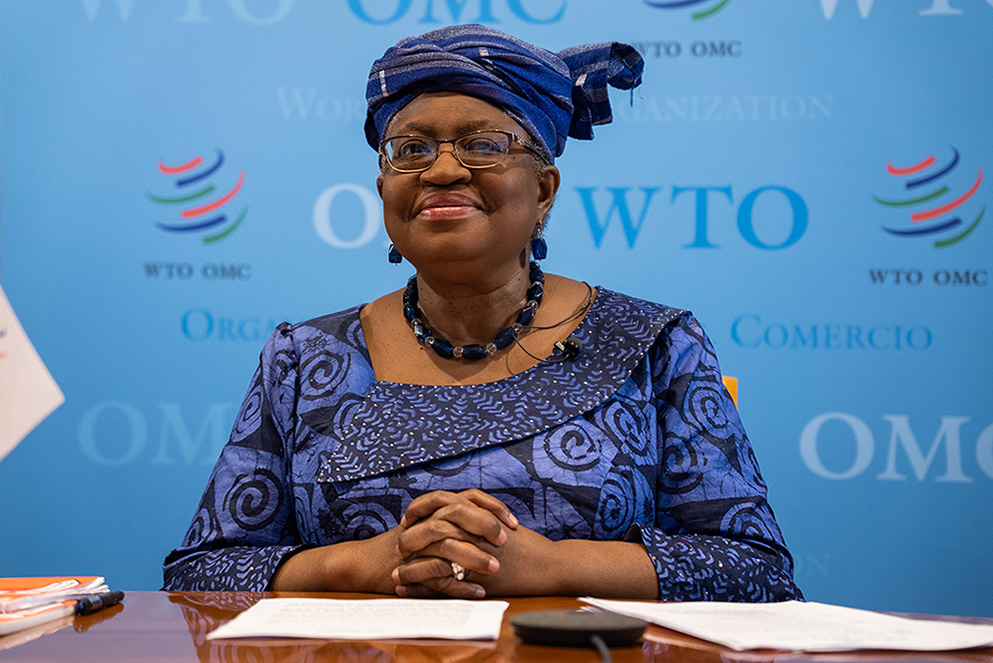SPEECHES — DG NGOZI OKONJO-IWEALA
More
Welcome Dr Tedros, Kristalina, Angel, David and Isabelle. And many many thanks from my part.
This stocktaking comes at a critical juncture.
In the three decades before any of us had heard of a novel coronavirus, open global trade helped lift more than a billion people out of poverty.
By tapping into cross-border flows of goods, services, and ideas, developing countries were able to accelerate growth and create better jobs.
For the first time in two hundred years, developing countries started to narrow the gap with richer ones.
Yet even at the time it was clear that many people and countries were unable to take advantage of trade opportunities because they lacked the supply side capacity to do so. That is why the Aid for Trade initiative was set up in 2005.
Today the pandemic is reversing hard-won development gains, adding to the problems facing the most vulnerable.
The World Bank has warned that more than 150 million people could be pushed into extreme poverty, ending a thirty-year downward trend. South Asia and Africa are likely to be the regions worst affected in terms of increased poverty and food insecurity.
The pandemic provoked the steepest fall in global trade that we have on record. In the second quarter of 2020, the value of global merchandise trade fell by 21% compared to the year before. Goods trade subsequently rebounded, though not to pre-crisis levels.
Services trade has fared less well, weighed down by travel and tourism, which in the third quarter were still more than two-thirds below pre-pandemic levels. Some services sectors benefitted: as workers and businesses moved online, trade in computer services was up by 9%.
The crisis is exacerbating inequalities of all kinds, from gender roles within households and societies, to the economic resilience of countries.
Least developed countries were hit hardest by the fall in trade, and have benefitted least from the rebound. Preliminary figures indicate LDC services exports fell 55% in the second quarter, year on year — nearly double the figure for the rest of the world. For the first three quarters of 2020, LDC goods and services exports were down 19%, compared to 15% for the rest of the world.
Many low- and middle-income countries are on track for weak recoveries. Kristalina has warned of a ‘great divergence’, in which advanced economies and a handful of emerging markets recover from the COVID crisis, while most developing countries are left behind. This would condemn millions more people to extreme poverty in the years ahead.
Our challenge, this week and in the years ahead, is to make sure this does not happen. The post-COVID recovery must not leave anyone, or any country, behind.
The first step towards this goal must be a rapid, global vaccine roll-out that ends the pandemic. This must include global scale up of manufacturing including in emerging markets and low-income countries with access to technology and know-how, whilst we work out the issues of intellectual property rights and the necessary flexibilities that also incentivise research and development. Such an approach would be the best global stimulus that money can buy. Closing the funding gap for the Access to COVID-19 Tools Accelerator is an urgent priority.
We have to ramp up vaccine production, particularly in developing countries, making the most, as I said, of existing manufacturing capacity and putting in new manufacturing capacity against the next pandemic. Countries rely on each other for the ingredients and components that go into making, distributing, and administering vaccines. We need more trade cooperation to address supply bottlenecks, lower regulatory hurdles, to facilitate trade, and finance vaccine purchases. That is why I would like the WTO to work with Members, industry, civil society, and other stakeholders to see what immediate action can be taken to boost vaccine production. This will also help us prepare for future health crises.
But vaccines alone will not prevent the divergence that Kristalina talked about.
Keeping global markets open is essential for a strong and sustained recovery. Delivering results at the WTO this year, including at MC12, would provide greater certainty and predictability for trade.
Aid for trade will remain essential. Trade finance must not be allowed to dry up.
An important lesson from the past year is that trade made the supply of key medical products more resilient. In the first half of 2020, exports of personal protective equipment grew by 50%. Trade in textile face masks grew more than six-fold. But there is scope to enhance resilience by making medical supply chains more geographically diverse — and this represents an opportunity for export-oriented investment in many low- and middle-income countries.
This jobs and diversification agenda ties into many issues being discussed at the WTO, such as e-commerce, investment facilitation, women in trade, and micro, small, and medium-sized enterprises, and the greening of trade. In fact, developing nations will need investment and assistance to adapt to climate change, build climate resilient infrastructure and build greener and more diversified economies.
Sessions this week will explore all of these issues in detail, from trade facilitation in landlocked countries to building pharmaceutical production capacity in developing and least developed countries.
Let me conclude by saying that I know development assistance budgets are under pressure. This is understandable. But we should remember that the organisations and Members that have cooperated on the Aid for Trade initiative have made a huge difference in peoples' lives. We have documented some of this in our publication “Strengthening the Capacity of Africa to Trade”, released yesterday.
Working together now to invest in the recovery of trading partners is not just the right thing to do. Building back a greener, more equitable, more prosperous global economy is a matter of economic self-interest for all countries. We can't afford not to.
Thank you very much.
Share
Share
Problems viewing this page? If so, please contact [email protected] giving details of the operating system and web browser you are using.
